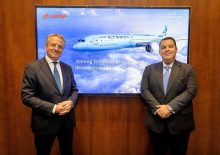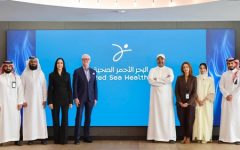 Cepsa, a Mubadala group company, and Etihad signed an MoU to accelerate the decarbonization of air transport by researching and producing sustainable aviation fuels (SAF). Both companies prioritise the development of these sustainable fuels as a tool to further reduce the carbon footprint of air transport and contribute to the goals of the UN’s 2030 Agenda for Sustainable Development and the fight against climate change. These fuels will be produced from circular raw materials that do not compete with food resources, such as used cooking oils, non-food animal waste or biodegradable waste from various industries, and will make it possible to reduce aircraft emissions by up to 80% compared to conventional kerosene. The partnership, announced at the ADIPEC Exhibition & Conference in Abu Dhabi, will also work on the development of new energy alternatives such as renewable hydrogen and the electrification of Etihad’s ground fleets, which include supply vehicles, baggage loading and unloading operations and aircraft assistance.
Cepsa, a Mubadala group company, and Etihad signed an MoU to accelerate the decarbonization of air transport by researching and producing sustainable aviation fuels (SAF). Both companies prioritise the development of these sustainable fuels as a tool to further reduce the carbon footprint of air transport and contribute to the goals of the UN’s 2030 Agenda for Sustainable Development and the fight against climate change. These fuels will be produced from circular raw materials that do not compete with food resources, such as used cooking oils, non-food animal waste or biodegradable waste from various industries, and will make it possible to reduce aircraft emissions by up to 80% compared to conventional kerosene. The partnership, announced at the ADIPEC Exhibition & Conference in Abu Dhabi, will also work on the development of new energy alternatives such as renewable hydrogen and the electrification of Etihad’s ground fleets, which include supply vehicles, baggage loading and unloading operations and aircraft assistance.
During the signing event, Maarten Wetselaar, CEO of Cepsa, said: “Decarbonising air transport is one of the major challenges of our times and Cepsa is committed to playing a critical role in meeting that challenge alongside important partners like Etihad. Partnerships like the one signed today reinforce our determination to transform air travel into a more sustainable mode of transport.”
Adam Boukadida, Chief Financial Officer, Etihad Aviation Group, said: “Aviation decarbonization is the biggest challenge facing our industry and the development of commercially viable sustainable aviation fuel is a key requirement to meet the industry sustainability target. Our MoU with Cepsa allows us to tackle the first challenge, building demand for SAF, which in turn encourages further production and increases availability to eventually lower costs and enable further SAF uptake from the wider industry. It’s a snowball effect, which is essential if we’re to overcome the main challenges standing in the way to a commercially viable solution.”
The MoU is in line with the European Commission’s Fit for 55 package, which includes a legislative initiative called ‘RefuelEU Aviation’ that aims to boost the supply and demand of aviation biofuels in the European Union to 2% use by 2025, 5% by 2030 and 63% by 2050. This partnership supports several of the 2030 Agenda’s Sustainable Development Goals: SDG 7 (ensure access to affordable, secure, sustainable and modern energy), SDG 8 (promote inclusive and sustainable economic growth, employment and decent work), SDG 12 (ensure sustainable consumption and production patterns) and SDG 13 (take urgent action to combat climate change and its impacts).
As one of the main producers and suppliers of aviation fuels in the Spanish market, this new agreement with a leading airline consolidates Cepsa’s aim to become a leader in the clean energy sector and to spearhead the decarbonization of air transport.
As part of its new strategic plan, Positive Motion, the company is developing an ecosystem focused on accelerating the decarbonisation of industrial customers and air and maritime transport, as well as the company itself, through the production of green molecules, mainly renewable hydrogen and biofuels. Cepsa aspires to be the leading biofuel producer in Spain and Portugal by 2030 and produce 2.5 million tons annually, with a particular focus on the sustainability of air traffic by producing 800,000 tons of SAF every year.
The company has established an ambitious roadmap to cut its emissions, placing it among the benchmark companies in its sector. Specifically, by 2030, it will reduce its Scope 1 and 2 CO2 emissions by 55% and the carbon intensity index of its energy products sales, which includes Scope 1, 2 & 3 by 15-20%. By 2050, Cepsa wants to go beyond net zero and have a positive impact, adding value in the communities where it operates by enabling its customers and other stakeholders to move forward in the right direction.
Etihad runs the most comprehensive, cross organisational aviation sustainability initiative ever undertaken. This umbrella programme, now in its third year, includes partnerships with Boeing, GE, Airbus and Rolls Royce, as well as a wide range of collaborations with pioneering new-technology organisations, academic researchers, smaller businesses and start-ups. Etihad’s flagship sustainability programmes include the Greenliner programme using the airline’s fleet of Boeing 787 Dreamliners as flying test-beds, as well as the Sustainable50 A350-1000 launched earlier this year.
In addition to the airline’s comprehensive testing and innovation programme, Etihad became the first airline to secure commercial finance based on verified compliance with the Sustainable Development Goals of the United Nations (UN SDGs).
 Tourism Breaking News
Tourism Breaking News


